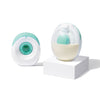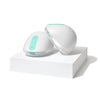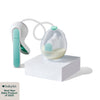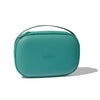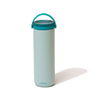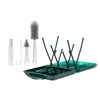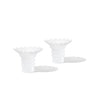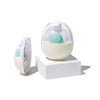Whether you’re new to motherhood or this isn’t your first rodeo, nursing your little one takes a valiant effort from even you, Supermom. Among all the snuggles and precious moments with your newborn, a good night’s sleep may seem to come as a rarity. The last thing you deserve are long nights spent tossing and turning.
Melatonin can be a great friend to those suffering from trouble sleeping, but can you take it while breastfeeding?
Because melatonin is a dietary supplement and not subject to the same approval process by the FDA, we do not have high quality data to know potential effects of it on breastfed babies. It is most likely safe when taken for a short duration and in low doses, but keep reading to understand the nuances.
What is Melatonin?
Melatonin is a naturally occurring hormone secreted by the pineal gland to regulate the body’s circadian rhythm. This production and release cycle is dependent on the time of day and light levels. Production begins 1-3 hours after daylight disappears and stops once light hits your eyes, working as your body’s “internal clock” that wakes you up much nicer than the blaring scream of your digital alarm.
Despite this, our sleep-wake cycles can get disrupted from time to time and some individuals - especially those experiencing frequent sleep frustration - may produce lower levels of melatonin than others.
As an over-the-counter dietary supplement, melatonin can be taken as an oral tablet to treat many sleep-related conditions such as insomnia, jet lag, and other irregular sleep patterns. While it appears to reduce the time taken to fall asleep, little is known about melatonin improving the quality of sleep.
Melatonin is safe when taken orally in recommended amounts (3 - 8 mg per day). Long term, consistent melatonin use can cause headaches, dizziness, nausea and daytime drowsiness. Just as any other sleeping pill, melatonin poses the potential danger of inducing drowsiness in less than ideal situations if not taken responsibly. Avoid driving, operating any form of machinery, or even nursing your child which could impair your ability to be alert and ensure their safety.
Melatonin in Breast Milk
Melatonin in milk similarly tracks nocturnal patterns found in maternal circulation. Although undetectable during the day, melatonin levels in milk rise before nighttime sleep, peaking in the early morning hours. Babies breastfed directly in the evening hours may even benefit from the melatonin mom naturally produces, helping improve baby's nighttime drowsiness and sleep.
When it comes to breastfeeding and taking melatonin, there is not enough research to know for sure if it is safe or not. Because it is a dietary supplement, the FDA does not require the same amount of rigorous safety testing as other prescription and over the counter drugs. So we just don’t have the data to know one way or another. Women who are taking melatonin supplements likely excrete more melatonin in breast milk which can cause drowsiness and irritability in babies.
Alternatives to Melatonin
If you don’t feel comfortable taking melatonin, there are a number of therapeutic routines you can implicate at home:
-
Guided Meditations - Let your body drift off to Dreamland with a soothing voice or melody. Breath in and out, 1 2 3 4…
-
Aromatherapy - Aside from the aesthetics, candles, diffusers, and other essential oils are a great way to relax for the night.
-
Try a bedtime tea - Herbal teas such as chamomile and lavender have soothing properties that help relieve anxiety and may benefit sleep.
-
Put the blue light away - Light of any kind may disrupt melatonin production and cause more difficulty trying to fall asleep. Plug in the charger and let both you and your phone get recharged for the day ahead!
Adjacent to melatonin, there are many other pharmaceutical remedies used to encourage relaxation and sleep. A few most common are as follows:
Valerian flower and root
Valerian root has a good track record of being a helpful self-treatment for anxiety, trouble sleeping, and depression. No evidence on the safety or efficiency of valerian root use has been recorded for pregnant or nursing women, althoughgeneral public use has been regarded as safe and tolerable.
Magnesium
Magnesium is great for boosting your energy levels and muscle relaxation. It’sconsidered safe and sometimes even recommended to some nursing mothers, seeming to have no special precautions while breastfeeding.
Lavender
The distinct scent of lavender has us relaxing already, just thinking about it! While lavender has been considered generally safe to ingest or use as a dietary supplement, the effects are unknown on a breastfeeding child. Since lavender oil contains estrogenic and antiandrogenic properties, avoid topical applications around the breast.
Breastfeeding and other drugs
Many lactating women who take other common drugs or prescription medications may be concerned about adverse effects on their infants.Substances such as alcohol show up in breastmilk relatively similar to blood alcohol content, and may agitate or disrupt your infant’s sleep pattern. Other medications and immunizations are safe to use during lactation with precaution. As a general rule of thumb, the mother’s necessity of drugs and medications should be weighed against the infant's risk of being exposed to that particular drug.
So should you take melatonin while breastfeeding? If you’re still debating, it might be best for your baby to hold off on the sleeping pills until your child is weaned off human milk to avoid any unknown risks.
Willow is here to help soothe you into the beautifully chaotic world of motherhood. Check out our blog page to get all the information you need to put your breastfeeding and pumping inquiries to rest. Remember, if you’re in need of extra aid sleeping at night, check with your healthcare professional to find a solution that is safe for you so your child can grow up healthy and strong, just like you Mom.
Medically Reviewed by: Dr. Michele Torosis, M.D.
Dr. Michele Torosis is a Stanford University-trained Obstetrician and Gynecologist. She is currently completing her fellowship in Female Pelvic Medicine and Reconstructive Surgery at UCLA, where she is receiving advanced training on pelvic floor disorders. She has a special interest in postpartum pelvic floor dysfunction including obstetric-related trauma. Dr. Torosis attended the University of California, Irvine for medical school and Duke University for her undergraduate education, graduating with a Bachelor of Science in Biomedical Engineering.
Prior to completing medical school, Dr. Torosis was involved in the early stages of Willow's product development. She worked one on one with new moms for Willow's first-in-woman clinical trial and assisted with early device prototyping. Through her practice, she has remained passionate about improving the breastfeeding experience for all women.
